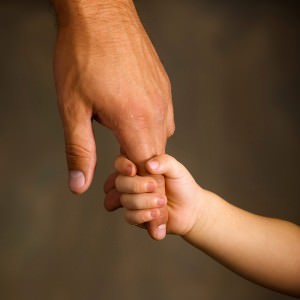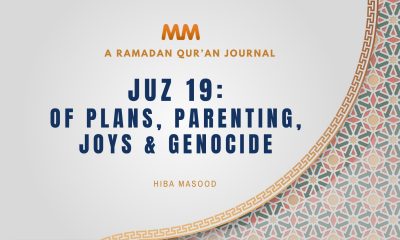Family and Community
The Apprentice
Published

بِسْمِ اللَّهِ الرَّحْمَـنِ الرَّحِيمِ
As someone who had no younger sibling; who never in her life babysat any little children for even an hour; who has more than the average penchant for personal privacy, solitude and demarcated boundaries of living space, I often find myself at the receiving end of the following question:
How can you have your children (now numbering three, masha’Allah) around at home all day without going crazy?
I was at some point along the first-time parenting journey myself such a skeptic who would have asked any other homeschooling mother exactly the same question! What’s more, I would have privately questioned her sanity or marveled at her – what was for me – an almost superhuman level of patience and forbearance.
Keep supporting MuslimMatters for the sake of Allah
Alhamdulillah, we're at over 850 supporters. Help us get to 900 supporters this month. All it takes is a small gift from a reader like you to keep us going, for just $2 / month.
The Prophet (SAW) has taught us the best of deeds are those that done consistently, even if they are small. Click here to support MuslimMatters with a monthly donation of $2 per month. Set it and collect blessings from Allah (swt) for the khayr you're supporting without thinking about it.
However, this post is not about homeschooling per se, perchance I alienate those conscientious parents who are striving to bring up their children well but choose to send them to school, lest they stop reading ahead with a dismissive eye roll.
In this post I want to talk about how, as a parent, something inside me regarding my inner views about parenting changed along the way, and today I want to talk about just that (i.e. what changed).
Answer: My own mindset – the way I chose to perceive the presence of my children around me for most part of the day – tantrums, bawls, dirty diapers, runny noses, incessant interruptions, and unwelcome preemption, et al.
I was once a snap-happy, cranky, short-tempered, prone-to-scream-at-the-drop-of-a-hat mother; at least I hope that now, I am less of that, as compared to when I had just one toddler and blew a fuse as soon as she climbed up on a chair and toppled a bowl of hot milk or tea on the dining table as soon as I turned my back.

Consequently, now when I look at my children and realize that they are just that – little human beings pre-programmed by Allah to act and react a certain way to environmental stimuli because of the age they are at – I cringe and seek forgiveness from Allah for my past skewed perception of them as a new parent.
The sister of Prophet Musa helping her mother get him back
A young mother-daughter duo worked as a team once to deal with the separation of a new baby boy. Yes, I find it endearing to read in the Quran, how the older sister of Prophet Musa [عليه السلام] helped her mother fend off anxiety and sorrow after the latter submitted to Allah’s command and put her infant son afloat in a river inside a chest:
إِذْ أَوْحَيْنَا إِلَى أُمِّكَ مَا يُوحَى
“Recall (when) We inspired in your mother that which is inspired,” [20:38]
وَأَوْحَيْنَا إِلَى أُمِّ مُوسَى أَنْ أَرْضِعِيهِ فَإِذَا خِفْتِ عَلَيْهِ فَأَلْقِيهِ فِي الْيَمِّ وَلَا تَخَافِي وَلَا تَحْزَنِي إِنَّا رَادُّوهُ إِلَيْكِ وَجَاعِلُوهُ مِنَ الْمُرْسَلِينَ
“And We inspired the mother of Moses, saying: Suckle him and, when you fear for him, then cast him into the river and fear not nor grieve. Lo! We shall bring him back unto you and shall make him (one) of Our messengers.” [28:7]
Anyone who has a baby (and even those who don’t) can perhaps only imagine the pain Prophet Musa’s mother must have felt upon being separated from her infant boy; how she must have summoned up enough fortitude and trust in Allah to cast her baby into a chest along a flowing river! Yet, she did it.
After her infant vanished from her sight, and her heart became empty, her “apprentice” came to her aid:
إِذْ تَمْشِي أُخْتُكَ فَتَقُولُ هَلْ أَدُلُّكُمْ عَلَى مَن يَكْفُلُهُ فَرَجَعْنَاكَ إِلَى أُمِّكَ كَيْ تَقَرَّ عَيْنُهَا وَلَا تَحْزَنَ وَقَتَلْتَ نَفْسًا فَنَجَّيْنَاكَ مِنَ الْغَمِّ وَفَتَنَّاكَ فُتُونًا فَلَبِثْتَ سِنِينَ فِي أَهْلِ مَدْيَنَ ثُمَّ جِئْتَ عَلَى قَدَرٍ يَا مُوسَى
“Behold! Your sister went forth and said, ‘Shall I show you one who will nurse and rear the (child)?’ So We brought you back to your mother, that her eye might be cooled and she should not grieve…..” [20:40]
Why did the sister step in to help? I think that perhaps if the mother had herself followed the chest containing the infant down the river, it would have roused onlookers’ suspicion that the infant belonged to her i.e. it was her own son. Further, since the Israelites were killing the male babies that year, the baby might have gotten killed as a result.
In order to be discreet in the pursuit of the baby, and also perhaps because a young girl child can perhaps run faster without garnering others’ attention to herself in public than a mother whose heart is torn with sorrow, the older sister of the infant not only kept the floating chest in sight but also played a key role in Allah’s plan of returning Prophet Musa to her mother without being killed that year:
According to Tafsir Ibn Kathir: “Then, his sister came and said, هَلْ أَدُلُّكُمْ عَلَى أَهْلِ بَيْتٍ يَكْفُلُونَهُ لَكُمْ وَهُمْ لَهُ نَـصِحُونَ – “Shall I direct you to a household who will rear him for you, and look after him in a good manner?”. She meant, “Shall I guide you to someone who can nurse him for you for a fee?” So she took him and they went with her to his real mother. When her breast was presented to him, he took it and they (Firaun’s family) were extremely happy for this. Thus, they hired her to nurse him and she achieved great happiness and comfort because of him, in this life and even more so in the Hereafter.”
By pondering on this incident in the Quran, I realized that Allah has used even young children to establish His decree on earth and used their “services” to carry out his Divine plans.
Could it be that children are smarter and more capable of handling responsibilities than we think?
The young lad traveling with Prophet Musa to seek knowledge
In Surah Al-Kahf, Allah describes how Prophet Musa [عليه السلام] firmly resolved to go on traveling until he could meet and attain knowledge from Khidr. Interestingly, he had a young lad with him throughout his journey, who was called Yusha Bin Nun, and their closeness and mutual companionship is evident from the way they talk about matters:
وَإِذْ قَالَ مُوسَى لِفَتَاهُ لَا أَبْرَحُ حَتَّى أَبْلُغَ مَجْمَعَ الْبَحْرَيْنِ أَوْ أَمْضِيَ حُقُبًا
“Behold, Moses said to his attendant, “I will not give up until I reach the junction of the two seas or (until) I spend years and years in travel.” [18:60]
The Arabic word used for the young lad is “فَتًى”, which means a youth in the prime of life (Lane). This implies a boy who is a tween or in his early teens.
At one point in their journey in the quest for knowledge, this young boy – the apprentice – played a key role in informing Prophet Musa [عليه السلام], when the latter asked him to bring him his food, about how their fish had escaped from them and taken a route in the sea, and how Shaitan had made him forget to inform him before about this:
قَالَ أَرَأَيْتَ إِذْ أَوَيْنَا إِلَى الصَّخْرَةِ فَإِنِّي نَسِيتُ الْحُوتَ وَمَا أَنسَانِيهُ إِلَّا الشَّيْطَانُ أَنْ أَذْكُرَهُ وَاتَّخَذَ سَبِيلَهُ فِي الْبَحْرِ عَجَبًا
“Did you see (what happened) when we betook ourselves to the rock? I did indeed forget (about) the Fish: none but Satan made me forget to tell (you) about it: it took its course through the sea in a marvellous way!” [18:63]
The escape of the salted dead fish into the water after coming back to life, was actually meant to be a signal from Allah that they had reached the place where they would find Khidr (Tafsir Ibn Kathir). When the lad told him this, Prophet Musa replied: “This is that which we have been seeking!” and then they both retraced their steps to that point in order to finally find and meet Khidr.
This incident brings to light quite a few things about adults dealing with youths:
- Adults should delegate responsibility to young people (tweens, teens, or even younger) and allow them to help them in their daily tasks, especially during strenuous journeys.
- We should take our children along on quests for knowledge of Deen.
- It really is okay for children to hang out with adults, contrary to the contemporary trend of pressuring children as young as two to “socialize” mostly with same-age peers and friends.
- Adults should have a frank and friendly relationship with younger people, especially their own children, students or helpers. Such an open and friendly relationship can make both benefit from apprenticeship. It was this easygoing openness that allowed Prophet Musa’s attendant to openly tell him about the escape of the fish, and admit that it was Shaitan that had made him forget to tell him. Note how he doesn’t lie nor give flimsy excuses, but comes clean and speaks up honestly.
- Adults should forgive and overlook the mistakes and errors of youths, as did Prophet Musa.
- One of the biggest advantages of being old(er) is that younger ones can serve you! E.g. Bringing you your food when you are tired. ;)
Prophet Ismail helping his father build the Ka’bah
Another interesting and historically poignant event narrated in the Quran involves a father-son duo doing what many father-son pairs would love doing in any era: a construction or building project. Only, the building they were putting together was no ordinary one:
وَعَهِدْنَا إِلَى إِبْرَاهِيمَ وَإِسْمَاعِيلَ أَن طَهِّرَا بَيْتِيَ لِلطَّائِفِينَ وَالْعَاكِفِينَ وَالرُّكَّعِ السُّجُودِ
“..And We imposed a duty upon Ibrahim and Ismael, (saying): Purify My house for those who go around and those who meditate therein and those who bow down and prostrate themselves (in worship).” [2:125]
وَإِذْ يَرْفَعُ إِبْرَاهِيمُ الْقَوَاعِدَ مِنَ الْبَيْتِ وَإِسْمَاعِيلُ رَبَّنَا تَقَبَّلْ مِنَّا إِنَّكَ أَنتَ السَّمِيعُ الْعَلِيمُ
“And when Ibrahim and Ismael were raising the foundations of the House, (Abraham prayed): Our Lord! Accept from us (this duty). Lo! You, only You, are the Hearer, the Knower.” [2:127]
We already know that Prophet Ibrahim was quite old when two sons, first Ismail and then Ishaq, were born to him. This indicates the considerable age difference between Prophet Ibrahim and Prophet Ismail when they were instructed by Allah to not just construct the holy Ka’bah, but to also purify it from the filth of idols and other physical and sexual impurities (Tafsir Ibn Kathir).
Once again, the Quran encourages us parents, albeit indirectly, to employ the aid, help and companionship of our children, even when the latter are young (barely out of childhood) in all our endeavors, but in particular, in those of our efforts, activities, toils and quests that are aimed at seeking the pleasure of Allah and upholding or propagating the Deen of Islam (monotheism).
In the above verses, it is obvious that not only did the young son help his elderly father physically build the Ka’bah, but he also helped him purify it, then engaged along with him in earnest supplication to Allah that He accept their efforts.
Contrast that to how some modern-day parents are themselves extremely active in propagating knowledge of Deen and doing Da’wah, yet their children are always in others’ company, be it nannies when they are younger, or secular-minded (or even atheist) friends when they are older.
I have personally attended religious talks in homes where the youngsters are never in attendance as their mother or father discusses/teaches the Quran to others. They are either watching television, out socializing with friends, or shut up in their rooms studying for exams.
It is a bit alarming to witness some Muslim families in which the parents are righteous and obey the tenets of Islam, and on top of that, they have been doing active teaching of the Quran and sunnah since their children were minors, yet as these children of theirs grow up, they seem to disregard obedience to even the obligatory rules and commands of Islam, such as praying all the five daily salah‘s or observing hijab at the mandated time.
As the years pass, a clear diversion is seen in the lifestyle and religiosity of the children of some da’ee’s and religious teachers, from the path of righteousness that their parents have adopted for themselves, so much so that, as the parents go off for recurring umrah, hajj, and Islamic da’wah retreats, the young children stay back at home, going out on dates or to drinking parties with their romantic partners and other friends. Are you surprised? It is more common than we acknowledge.
The Quran should make us modern-day parents who think that religion is a personal matter and a “choice” that their little children should make on their own once they reach the age of maturity, wake up and smell the coffee: we should take our children along with ourselves on the journey towards Allah as soon as we can, since they are little (even babies), and try not to leave them with human or digital babysitters to “come towards religion on their own”, when they get older.
In answer to the question…
I have alhamdulillah come a long, long way since my perception of my children as noise-creators, troublemakers, clutter-generators and stress-inducers who need to be run after and coerced to behave properly.
Now I see them as my young “apprentices” in the path of Deen, albeit ones who need a stern eye and a reprimand here and there when they, acting upon their natural human instincts, act naughtily or behave mischievously.
I find myself enamored by their honesty (they are frank and upfront to the point of being totally blunt), intrigued by their relentless spontaneity, and in complete admiration of their positivity and lack of grudges and enmity for others.
I now love having these wonderful beings in my life 24/7, because contrary to what it appears to be like, I am learning immensely from them. For the first time in my life, I am spending days and nights in the company of human beings who have an unquenchable thirst for knowledge, an incessant curiosity about the world around them; an insatiable ability to ask questions until they get satisfactory answers, and a refreshingly tireless interest in others, especially in their Lord, Allah, and in the reality about the life of this world.
As little hands help me pick up the crumbs from the carpet, fold the laundry, wipe the counter and even massage my forehead when I am tired, I sorely regret and seek forgiveness for ever considering these “apprentices” to be the cause of unwelcome interruptions and “disturbances” in my so-called hitherto peaceful and methodical life, and thank Allah with the bottom of my heart for giving me little helpers in the path of His Deen, who will hopefully always be my side as we tread along it to reach the final, coveted destination: Allah’s pleasure in the Hereafter.
Keep supporting MuslimMatters for the sake of Allah
Alhamdulillah, we're at over 850 supporters. Help us get to 900 supporters this month. All it takes is a small gift from a reader like you to keep us going, for just $2 / month.
The Prophet (SAW) has taught us the best of deeds are those that done consistently, even if they are small. Click here to support MuslimMatters with a monthly donation of $2 per month. Set it and collect blessings from Allah (swt) for the khayr you're supporting without thinking about it.
Sadaf Farooqi is a postgraduate in Computer Science who has done the Taleem Al-Quran Course from Al-Huda International, Institute of Islamic Education for Women, in Karachi, Pakistan. 11 years on, she is now a homeschooling parent of three children, a blogger, published author and freelance writer. She has written articles regularly for Hiba Magazine, SISTERS Magazine and Saudi Gazette. Sadaf shares her life experiences and insights on her award-winning blog, Sadaf's Space, and intermittently teaches subjects such as Fiqh of Zakah, Aqeedah, Arabic Grammar, and Science of Hadith part-time at a local branch of Al-Huda. She has recently become a published author of a book titled 'Traversing the Highs and Lows of Muslim Marriage'. For most part, her Jihad bil Qalam involves juggling work around persistent power breakdowns and preventing six chubby little hands from her computer! Even though it may not seem so, most of her time is spent not in doing all this, but in what she loves most - reading.


Study Classical Texts the Traditional Way | Session 31

Khurshid Ahmad, Pakistani Jamaat Leader And Scholar, Dies Aged 93

Belgian Muslim Historian Yahya Michot Passes Away

Study Classical Texts the Traditional Way | Session 30

The Theater Of Security: How Kindness And Cruelty Coexist At Our Borders

Hot Air: An Eid Story [Part 1]

As Light As Birdsong: A Ramadan Story

Cover Queen: A Ramadan Short Story

IOK Ramadan 2025: Soul Food | Sh Furhan Zubairi

IOK Ramadan 2025: Asking for Evil | Sh Mudassir Mayet

IOK Ramadan 2025: Four Steps | Sh Zaid Khan

IOK Ramadan 2025: Do Your Best | Sh Zaid Khan

IOK Ramadan 2025: Giving Preference to Others | Sh Zaid Khan

IOK Ramadan 2025: Which Group Are We In? | Sh Zaid Khan











Zari DSilvah
May 4, 2012 at 4:32 AM
Jazakallahu khayran Sr. Sadaf! As a mother-to-be insha’allah, I was pondering over similar doubts myself! May Allah reward you for your efforts ameen.
Abu Yusuf
May 4, 2012 at 11:15 AM
Salaam Alaykum,
Sadaf is the best female writer on MM. Keep it up. One correction if you allow – in the ayah 20:38, Sadaf translated the first word “Idh” as “When”. In fact that is a common mistake. “Idh” is not short for “idha” which is why people think it means “when”. Rather, “idh” is short for “udhkuroo” and so “idh” means “Remember” or “Recall”.
Abu Yusuf
May 5, 2012 at 1:16 AM
Salaam Alaykum,
Some people were confused about the usage of ‘idh’ in the ayah I referenced. To further clarify my point – “Idh” when used as the word commencing an ayah is the object of the verb “udhkuroo” and thus means remember/recall. If “idh” is found in between the sentence but not commencing, then it becomes zarf zamaan and denotes action in the past i.e. “when”. So in the ayah Sadaf referenced, the correct translation is “remember”. In another ayah, for e.g. ayah 40 of soorah Tawbah where “idh” does not commence the ayah, “idh” translates as “when”. {……faqad nasarahullaahu idh akhrajahu….} = {….for Allah did indeed help him when the disbelievers drove him out…}. Here, the correct translation of “idh” is when, but if “idh” commences an ayah, then it means “remember”.
So I hope the ayah translation in the article above gets corrected as precision in Qur’anic translation is of utmost importance and sensitivity.
Sadaf
May 13, 2012 at 10:35 AM
وعليكم السلام
I have made the amendment. Jazak Allah khair for the suggestion.
Holly Garza
May 4, 2012 at 2:17 PM
Beautiful mashaAllah!!!!
Madeehatariq
May 4, 2012 at 2:52 PM
now that is a whole new perspective!!! jazakAllah khair for sharing sister sadaf!! may Allah take the best work of deen from u and ur apprentices, as well as from us! Amen!
Sadaf
May 7, 2012 at 5:21 AM
Ameen!
Amal
May 5, 2012 at 4:11 PM
Jazaakillahu khairan ukhtee
Juliherman
May 5, 2012 at 9:24 PM
jazakillah khair sadaf! I always love your writings and musings and reflections especially the Quran based ones (well all that I’ve read are Quran based alhamdulillah mashaaallah!);)
You just gave me proofs for what I’ve been advocating mashaAllah! It’s nice to see this perspective from the Quran subhanallah.
Our world today segregates the adult from the children in what I see as artificial settings …and this has caused some problems in my opinion. Trying to look for a shadowing opportunity for my teens is challenging. I love the idea of apprenticeship. I was reading Roger Schank’s Teaching Minds, and well he has a radical idea about teaching (hey, you should read it :)) but I like what he says about training our children as young as high school rather than have them take standard subjects that they have to take because they could or might use them some day. I strongly believe in involving our youth, as young as 6/7 in our community projects, dawah work, from small to large scales. Even as young as 6, they can do simple stuff like help set the tables in community events etc. The only thing is, the adult volunteers need to let these kids help. Make them feel welcome and don’t make them feel like they’re a nuisance. Ask for their opinions and respect it. I see in our communities, unfortunately, some adults don’t even look at the younger ppl in the community, barely gives them the time of day. Where is the mercy towards the young? I believe that if we treat our children like children, they will act like chidlren. Give them responsibilities and inshaallah, through mistakes and training, they will be responsibile. Don’t underestimate their abilities. I learned this years ago :D Jazakillah khair for this Sadaf, again. One of those topics I feel so strongly about.
Sadaf
May 7, 2012 at 4:55 AM
Jazakillah khair for your insightful input, Juli.
Your homeschooling blog was actually a major inspiration for me to at least try to homeschool my own children; to give it one test shot to see how it goes.
I used to read it regularly since when my first born was just a toddler. :)
AnonyMouse
May 6, 2012 at 10:16 AM
SubhanAllah, your post reminded me of how my parents raised my brothers and I – from the very moment we could run from one room to another, we were involved in our local Islamic centre and expected to help in every way… whether it was summoning husbands for their wives, passing along plates and cups for events, or painstakingly acting as “cashier” during the Islamic book fairs!
I only hope that I can provide the same kind of education and “apprenticeship” for my own daughter inshaAllah!
Aziza
May 6, 2012 at 12:09 PM
Allah has truly blessed you with deep Quranic insight sister Sadaf, I never even realized this. JazakAllah Khair for this beautiful reminder!!!
huda
May 9, 2012 at 12:28 AM
wow…i am pretty similar to you ..blessed with 3 children and the also the one with no younger sibling …thanks for showing me things in a new light….it is so hard to be patient when all three are cranky the same time…May Allah(swt) make us and our progeny beloved to Him.
ML
May 13, 2012 at 3:34 PM
I agree with Sadaf that these days there is a major difference in how much importance the parents and children give to religion. I feel that to make the children feel the importance of religion we should teach it to them through the means that they like. As in give them a little treat for every time they pray or they fast. Giving them little incentives actually works. And these days the game culture is taking over all of the free time children have. So we should make religion practising interesting and fascinating for them. For instance install a Tasbih App
http://itunes.apple.com/pk/app/tasbeeh/id480785283?mt=8. This is just for very young kids. Once they start finding peace in the remembrance of Allah, the process of giving incentives will end :)
Saba
February 14, 2014 at 6:50 PM
As salaamalykum sister,
I read ur post, alhamdulillah I am pursuing taleem al Qur’an as a correspondence course, I started the course so as to gain knowledge of quran and teach my kids deen and also to answer their quiries , alhamdulillah now am in Juz 14, I now realize the person who needed improvement was I myself, alhamdulillah this is an investment for my own self improvement.
I would like to keep in touch with you inshallah.
Pingback: A Mother’s Single-Handed Upbringing | Verse By Verse Qur'an Study Circle